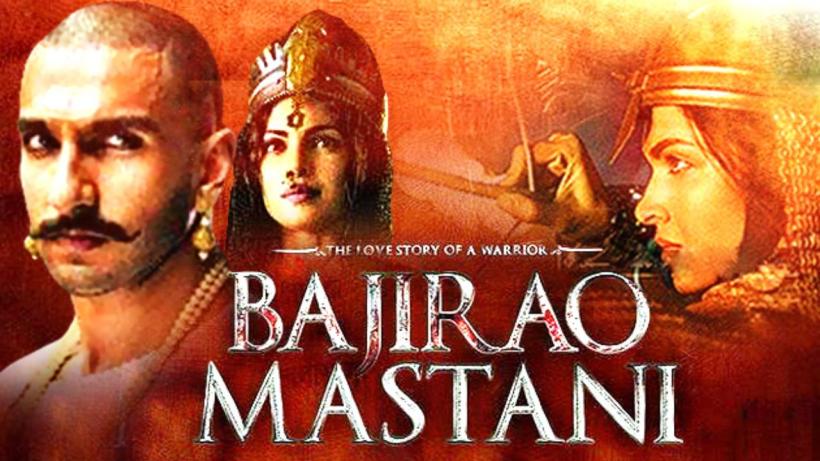Directed By: Sanjay Leela Bhansali
Written By: Prakash Kapadia
Cast:
Ranveer Singh – Bajirao I
Priyanka Chopra – Kashibai
Deepika Padukone – Mastani
Tanvi Azmi – Radhabai
Vaibbhav Tatwawdi – Chimaji Apa
Milind Soman – Pant
Aditya Pancholi – Pratinidhi
Ayush Tandon – Nanasaheb/ Balaji Bajirao
Mahesh Manjrekar – Chhattrapati Shahu
Irrfan Khan – Narrator
Language: Hindi; Marathi Genre: Action; Romance; Drama
Bhansali’s Bajirao Mastani is a true love story of epic dimensions brought out from the shadows to which history has confined it to appease powerful yet blinkered mindsets.
Bajirao (Ranveer Singh) is a young warrior of an illustrious lineage who is elected to the office of Peshwa in the Maratha Empire despite his youth, because of his breadth of vision and intelligence. Willing to take risks and making impulsive decisions, he embarks on several successful military campaigns. While not accompanied by his wife Kashibai (Priyanka Chopra), her devotion to him is his strength.
It is the impulsive campaign to Bundelkhand that brings Bajirao face to face with Mastani (Deepika Padukone), a princess of Bundelkhand. He falls in love with her but realises that a union between them is unlikely so he returns, pushing away thoughts of her. Mastani, however, takes a particular act of his as a sign and follows him to Pune. It is here that all the subterfuge against this unacceptable union begins. It is helmed by Bajirao’s mother Radhabai (Tanvi Azmi) and her son Chimaji Apa (Vaibbhav Tatwawdi).
It is almost frightening to witness how fanatical people can be about ritual purity, religion and the ilk. It is ironical too because the people oppose the Mughal Empire and Muslims but use Urdu-influenced Hindi in official and personal contexts. A significant line in this context is by Bajirao when he said (it’s not a verbatim quote) that yes he fights against the Mughal Empire because he is against them and what they do, not their religion. This is a telling statement in the current socio-political situation as people get blindsided by belief systems that have almost hypnotic qualities. The film is thus subtly critical of the times.
However, what was a letdown is that film focuses on the interior intrigues of Shaniwar Wada (Peshwa’s house) as opposed to the Maratha Empire. The character of the Pratinidhi (Aditya Pancholi) thus becomes a little underused because there were many political intrigues that involved the Peshwa and him in opposing factions.
Strangely enough, for a movie titled Bajirao Mastani, Mastani seems to be in the shadows and Kashibai is much more prominent. The filmmaker is sympathetic to Kashibai’s plight because she is the simple-hearted woman who finds her faith in Bajirao shattered by the entry of another woman. She believed that he could never do anything wrong and was a moral, upright man. One of the opening sequences, show her in conversation with her friend whose husband was executed by Bajirao for spying against him. It is Kashibai’s vehement refusal to accept any slight against her husband that makes the scene poignant.
It is then fitting, that a woman like Mastani, whose story has frequently been the focus of erasure or sidelining by forces then and now, should still be cloaked in mystery. Bajirao-Mastani’s love story is affecting because even if the orthodox society of his times chose to see her as his mistress, he saw her as his lawfully wedded wife and did everything to give her and their son, equal rights. Their love story in the film hasn’t been given much time to develop, say unlike the romance in Hum Dil De Chuke Sanam. This could be a bit of disappointment but then again, it is a film for the 21st century audience.
Interestingly, the film posters give the first clues about the portrayals in the film – the left side of any image is seen as less eye-catching because generally humans see the right side as more dominant. So it is appropriate then that Kashibai is to the left of the viewer, however, her image is more forward-positioned. Mastani is appropriately to the right, yet her image is withdrawn from the viewer’s gaze. Bajirao’s is a centred image, very squarely placed – like someone whose position in history cannot be shaken.
Bajirao’s relationship with Kashibai is eloquently played out by the actors. Their marriage is based on friendly camaraderie and shared confidences. Nevertheless, their intimacy plays out in a rather traditional manner with Kashibai being the recipient of her husband’s desire. On the other hand, Mastani, probably because of her experiences as a warrior, is more straightforward about her feelings and passionate in her expression.
The film performance-wise and casting-wise is impeccable. The casting of Milind Soman as Pant was a refreshing change and his interactions with Bajirao have a drawing power to them. Even the interactions between Radhabai and Kashibai are noteworthy and reveal the extent of their filial devotion. All the characters hold their own in the narrative.
And it is Ranveer Singh’s finest performance to date. He is Peshwa Bajirao in every frame, though the song Malhari is a little discomfiting. It is a great listen but if he was Bajirao in every frame, in this song he was more of a controlled Ranveer Singh. Pinga however, is actually brilliant, so pay close attention to the lyrics.
A film made for modern audiences; it may seem slightly fast-paced in terms of narrative but still possesses a well-meshed screenplay and flawless camera-work with all the grandeur of a Bhansali film.
